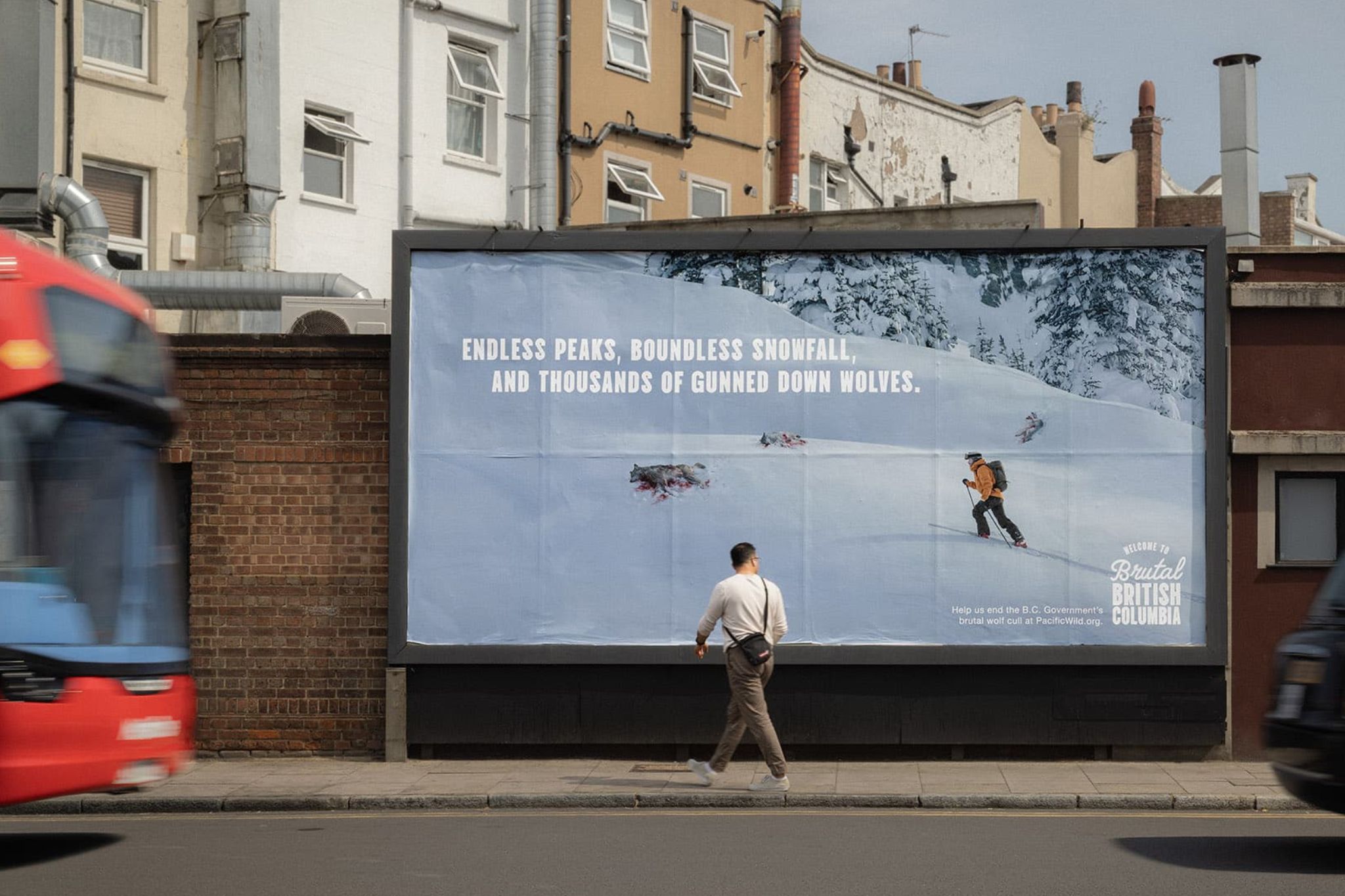Lifestyle
Tourists Shocked as Victoria Pop-Up Exposes B.C. Wolf Cull

Tourists visiting downtown Victoria earlier this month encountered a startling sight at what appeared to be a typical souvenir shop. Instead of the expected maple-leaf mugs and British Columbia postcards, the pop-up store showcased bloodstained tote bags, lifeless plush wolves, and stark visual displays. This initiative, part of Pacific Wild’s “Brutal British Columbia” campaign, aims to challenge the province’s polished tourism image and highlight what advocates describe as a “brutal secret” concerning wildlife management.
Launched on August 1, the campaign is a collaborative effort between Pacific Wild and the Vancouver-based agency ONE23WEST. According to Natasha Wehn, project director at Pacific Wild, the objective is to “flip the province’s glossy tourism brand on its head.” Wehn emphasized the contrast between the allure of British Columbia’s wilderness and the troubling realities hidden beneath the surface.
The campaign gained international attention on August 13, designated as International Wolf Day. Pacific Wild placed billboards in London and Berlin, juxtaposing picturesque landscapes of British Columbia with jarring images of wolves being hunted from helicopters. They also premiered a short film at the B.C. Legislature, capturing the reactions of visitors who encountered the pop-up shop.
“We’re not asking anyone to turn away from B.C. — we’re asking them to speak up for it,” Wehn stated in the campaign’s launch video on YouTube. “What’s at stake is too important to ignore.” Over the past decade, Pacific Wild has gathered more than 500,000 signatures urging the provincial government to halt the wolf cull, while also engaging with decision-makers and pursuing legal avenues for change.
Details of the Wolf Cull Program
Since 2015, British Columbia has implemented a controversial predator reduction program, resulting in the shooting of more than 2,100 wolves from helicopters. This initiative has incurred costs exceeding $10 million to taxpayers, according to Pacific Wild’s data. Conservation advisor Ian McAllister criticized the program, labeling it “a war on wolves throughout most of British Columbia.” He noted that over 2,500 wolves have been killed, and expressed concerns that the government lacks a clear endpoint for the cull.
Originally intended to protect endangered caribou herds, the program has faced backlash for failing to address the primary threats to these populations. Critics argue that habitat loss due to logging, mining, and recreational activities has placed caribou at risk. McAllister stated, “Blaming wolves is both unscientific and unethical,” pointing to the lack of evidence supporting the effectiveness of the cull in saving caribou.
A study from 2020 revealed that over 900 square kilometers of critical caribou habitat had been logged since 2014, despite ongoing culling efforts. The program has also faced moral questions regarding animal welfare, as wolves are often pursued until they are exhausted, sometimes left injured. “Wolves are absolutely essential,” McAllister argued, highlighting their role in maintaining ecological balance.
The cull has even utilized “Judas wolves,” collared animals spared to lead hunters back to their packs. Pacific Wild is now advocating for an independent audit of the program, with McAllister asserting that independent biologists would likely recommend its immediate cessation.
Growing Support for Change
The “Brutal B.C.” campaign has garnered support from Indigenous leaders and eco-tourism operators alike. The Union of B.C. Indian Chiefs has referred to wolves as “relatives, revered as sacred,” emphasizing their integral role in Indigenous culture and ecosystems. The group stated, “Wolves are also a keystone species whose demise creates imbalance that ripples across critical ecosystems.”
Tourism operators have echoed these sentiments, voicing concerns that the cull threatens both wildlife and British Columbia’s global reputation. Colin Griffinson, owner of Pacific Yellowfin Charter, remarked, “After decades of guiding visitors along this coast, I’ve seen firsthand how essential wolves and other wildlife are to the magic of this place.” He emphasized that the cull poses a significant threat to the province’s identity and economy.
In 2023, tourism generated $22 billion in revenue and supported over 125,000 jobs in British Columbia. Campaigners contend that the ongoing culling of wolves, coupled with habitat destruction, not only jeopardizes wildlife but also tarnishes the province’s reputation internationally.
Pacific Wild continues to advocate for an end to the wolf cull and the protection of British Columbia’s wilderness. They encourage individuals to get involved by visiting their website for resources or by contacting Premier David Eby‘s office directly at 250-387-1715.
-

 Science3 months ago
Science3 months agoToyoake City Proposes Daily Two-Hour Smartphone Use Limit
-

 Top Stories3 months ago
Top Stories3 months agoPedestrian Fatally Injured in Esquimalt Collision on August 14
-

 Health3 months ago
Health3 months agoB.C. Review Reveals Urgent Need for Rare-Disease Drug Reforms
-

 Technology3 months ago
Technology3 months agoDark Adventure Game “Bye Sweet Carole” Set for October Release
-

 World3 months ago
World3 months agoJimmy Lai’s Defense Challenges Charges Under National Security Law
-

 Lifestyle3 months ago
Lifestyle3 months agoVictoria’s Pop-Up Shop Shines Light on B.C.’s Wolf Cull
-

 Technology3 months ago
Technology3 months agoKonami Revives Iconic Metal Gear Solid Delta Ahead of Release
-

 Technology3 months ago
Technology3 months agoApple Expands Self-Service Repair Program to Canada
-

 Technology3 months ago
Technology3 months agoSnapmaker U1 Color 3D Printer Redefines Speed and Sustainability
-

 Technology3 months ago
Technology3 months agoAION Folding Knife: Redefining EDC Design with Premium Materials
-

 Business3 months ago
Business3 months agoGordon Murray Automotive Unveils S1 LM and Le Mans GTR at Monterey
-

 Technology3 months ago
Technology3 months agoSolve Today’s Wordle Challenge: Hints and Answer for August 19









